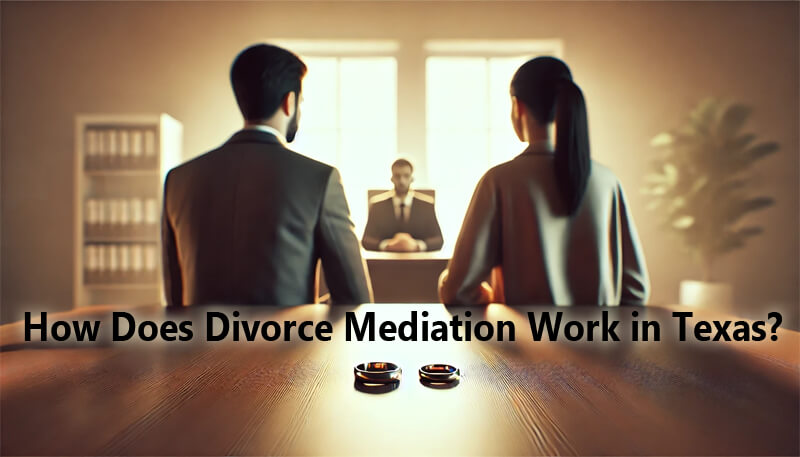Texas Uncontested Divorces: What You Really Need to Know
Ready to get a divorce without the courtroom drama? An uncontested divorce in Texas is your ticket to a faster, easier split. We’re talking minimal hassle, lower costs, and a smoother ride to moving on. Let’s get you up to speed on what it all means, how long it takes, and how Longworth Law Firm can make it happen for you.

What Is an Uncontested Divorce in Texas?
An uncontested divorce is basically the “we agree on everything” option. Both you and your soon-to-be-ex are on the same page about property, kids, and support. No messy fights, no court battles—just sign the papers and get it done. This is the simplest way to go if you can agree on the big stuff.
Am I Eligible for an Uncontested Divorce?
Here’s what you need to make it work:
- Residency: One of you must have lived in Texas for at least six months and in your current county for 90 days.
- Grounds for divorce: Texas lets you file a no-fault divorce. No need to point fingers—just say “insupportability,” which means you can’t make it work anymore.
- Agreement: You must agree on everything—property division, child custody, spousal support, you name it.
How Fast Can You Get an Uncontested Divorce in Texas?
Texas has a 60-day waiting period from the time you file the divorce petition. So, if you’ve got your ducks in a row, you could be single again shortly after that. A couple of months and you’re free! (Well, legally, at least.)
Do I Have to Go to Court?
Probably not! Most uncontested divorces can be handled without anyone stepping into a courtroom. Your lawyer can file everything, and the judge signs off. But if something’s incomplete or a judge needs clarification, you might have to make a quick appearance—but don’t worry, it’s nothing like the TV shows.
Why Go Uncontested Instead of Contested?
Three words: faster, cheaper, easier. In a contested divorce, you’ll deal with court hearings, lawyer fees, and months (if not years) of back-and-forth. If you and your spouse can agree, uncontested is a no-brainer. It’s the best way to avoid stress and move on with your life.
Factor |
Uncontested Divorce |
Contested Divorce |
|---|---|---|
Time |
2-3 months (depending on agreement speed) |
Can take a year or more due to court hearings |
Cost |
Generally lower due to fewer legal fees |
Higher, as more legal representation and court time are required |
Court Involvement |
Minimal (most can avoid court appearances) |
Multiple court hearings may be required |
Stress Level |
Lower, due to quicker resolution and agreement |
High, due to prolonged litigation and disputes |
So, How Much Is an Uncontested Divorce in Houston?
We can’t drop specific numbers here, but we can say that uncontested divorces are generally a lot lighter on the wallet than contested ones. Why? Less back-and-forth means fewer billable hours for lawyers and fewer court fees. Plus, if you and your spouse are in sync, it’s possible to save even more by minimizing mediation or extra legal services.
What Happens After You File an Uncontested Divorce?
Once the divorce petition is filed, here’s what goes down:
- Serve the petition: Your spouse gets notified unless they agree to waive this step.
- Make it official: You finalize the agreements on property division, custody, and support.
- Wait 60 days: After that, the court reviews your paperwork, and boom—divorce decree granted.
What If We Need Mediation?
Even if your divorce is uncontested, you might run into a few minor sticking points—especially when it comes to things like child custody or splitting up the property. Mediation is a great option for helping you both reach an agreement without going to court. It’s a more informal process where a neutral third party helps you talk it out and come to a compromise. You’d be surprised how smoothly things can go with a little extra help.

Common areas where mediation can help include:
- Property Division: Who gets the house, cars, or other marital property.
- Child Custody: Arrangements for living schedules, visitation, holidays, and school breaks.
- Spousal Support: Deciding if support is necessary and agreeing on an amount and timeline.
- Debt Allocation: Splitting debts such as mortgages, credit cards, or personal loans.
Default Judgment Divorce in Texas: What If My Spouse Doesn’t Respond?
If your spouse isn’t in the mood to cooperate and ignores the petition, Texas lets you move ahead with a default judgment. Basically, the court says, “Well, they had their chance,” and finalizes the divorce without them. Just make sure your paperwork is airtight.
Converting Contested Divorce to Uncontested
Started out fighting but cooled down enough to agree on the terms? You can absolutely switch from contested to uncontested divorce. Mediation helps make that happen, and it speeds things up. No need to drag out the process if you can agree.
Property Division and Child Custody: How It Works
Even in an uncontested divorce, you must figure out how to split things up. Texas is a community property state, meaning most stuff you got during the marriage is split down the middle unless you’ve agreed otherwise. And if you’ve got kids, a child custody agreement is a must. Get the details right to avoid problems later.

When it comes to custody, the more specific the agreement, the better. Who gets the kids and when? What about holidays and vacations? You need a solid plan that works for both of you and is legally enforceable. The goal here is to avoid any post-divorce confusion—or worse, going back to court.
Spousal Support in Uncontested Divorce
You and your spouse need to decide whether spousal support (a.k.a. alimony) is on the table and what the terms will be. As long as you both agree, you’re good. But if things get tricky here, it might lead to contested territory.
Thinking About Legal Separation?
Unlike some states, Texas doesn’t officially recognize legal separation, meaning that if you want to officially untangle your finances and responsibilities, you need to file for divorce. Sure, you and your spouse can live apart and work out agreements on your own, but it won’t carry the same legal weight as a divorce decree. So, if you’re looking to formalize things, divorce is the way to go.
Post-Divorce Modifications
Life changes, and so do your needs. Even after an uncontested divorce, there may come a time when you need to modify your child custody, child support, or spousal support agreements. Maybe one of you gets a new job, moves to a different city, or has a change in income. Texas law allows for post-divorce modifications, but you’ll need to go through the courts to get these updates approved. A good lawyer can help streamline this process, too.
Common triggers for post-divorce modifications include:
- Job Changes: One parent gets a new job that affects their financial situation or location.
- Changes in Income: Significant income changes affect child or spousal support payments.
- Relocation: One parent moves, which may require custody and visitation adjustments.
- Health Issues: Medical conditions that impact a parent’s ability to care for the children.
Don’t Forget the Taxes!
Divorce can have tax implications, especially when it comes to things like property division and spousal support. It’s worth keeping this in mind as you work through your agreements. Having a lawyer help you navigate these waters can make sure that no financial surprises pop up when tax season rolls around. Plus, no one likes surprise IRS bills!
Some things to keep in mind:
- Filing Status: You must update your filing status to single or head of household.
- Child Support: It is not taxable for the recipient or deductible for the payer.
- Spousal Support: Alimony may be taxable or deductible depending on your divorce agreement.
- Property Transfers: Dividing property may have tax implications if not done correctly.
Ready for an Easy Divorce? Call Longworth Law Firm Today!
At Longworth Law Firm, we’ve helped countless couples breeze through their uncontested divorces. Why waste time stressing over paperwork and court appearances when we can handle it for you? We’ll get your divorce done quickly, with zero drama and a lot less hassle.
Contact us today to get started. Let us take care of the legal stuff so you can focus on what’s next. Divorce is tough, but the process doesn’t have to be. Let’s make it easy—call Longworth Law Firm now!
